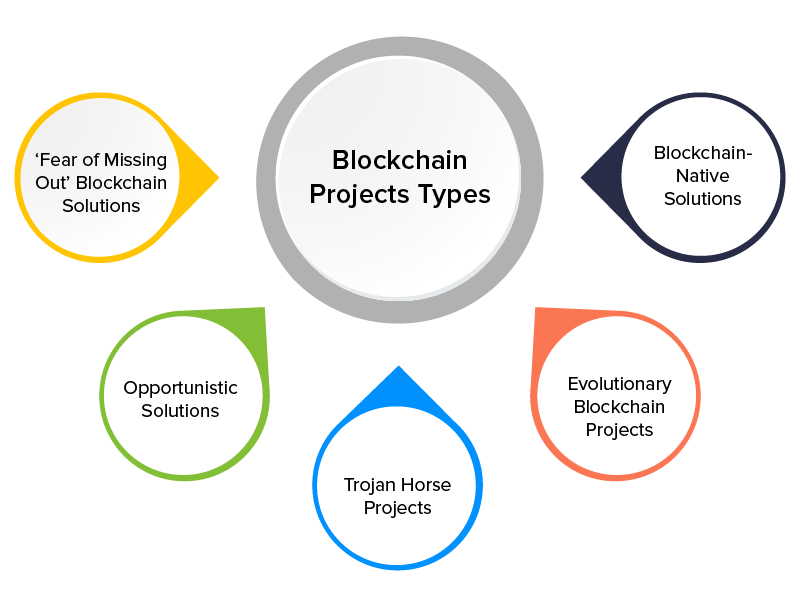A Guide to the Types of Blockchain Projects Ruling the Decentralized Economy
Since Stuat Haber and W Scott Stornetta first described blockchain in 1991, it has come a long way. Technology has evolved into one of the century’s most significant advancements, opening up a slew of new opportunities in a variety of sectors and industries.
The fact that practically every entrepreneur, digital marketer is interested in studying the basics of blockchain technology and looking forward to entering the area is proof of this. And, finally, getting a piece of the market, which is expected to be worth USD 39.7 billion by 2025.
They’ve also started looking at the latest blockchain trends and the best business models that the industry’s leading players are employing.
With the expanding popularity of the technology, new ways to use it for business transformation are emerging, as are new sorts of blockchain business ideas, leaving everyone curious as to which of these is destined to help them lead digital environments in 2021. By the time you reach the conclusion of this post, you will definitely be more knowledgeable about how Blockchain is ruling the market.
[Just in case you want to take a recap of the role of blockchain types on the industries, check our blog on ‘the impact of blockchain on the economy’.]
Explained: 5 Categories of Blockchain Projects
1. ‘Fear of Missing Out’ Blockchain Solutions
FOMO is one of the first types of blockchain solutions that is currently being developed (Fear of Missing Out).
As depicted from the name, these types of projects are brought into life just to ensure that companies do not remain behind in the market. They have not held any meeting and discussed its role into their traditional business model and the possible outcomes they would derive from it in a particular time span. Or even looked into whether investing in blockchain app development is beneficial for them.
Rather, they have just taken this step just to show that they are innovative and work with the latest technology trends impacting the business world, most importantly all the blockchain development companies.
As you might have suspected, these kinds of initiatives don’t add much value to the organization and are mostly used as a marketing tool. It just increases the chances of your target audience giving a second look to your business products/services or competitors’ fear of missing out and taking the same step.
Furthermore, ill-conceived blockchain solutions projects may overburden the existing business environment, resulting in increased expenditures. This can make leaders conclude that they ‘tried and failed’ in establishing their blockchain app development firm or doubt on its future.
2. Opportunistic Solutions
Opportunistic solutions is the second category in which blockchain projects fall.
These blockchain solutions are designed to tackle any known problem, particularly those involving record-keeping. Even when they are not functioning for an extended period of time, they bring value to the firm.

The sole drawback to this project type is the risk of losing control of data and contracts later on.
When looking into the real-life blockchain project examples of Opportunistic blockchain ideas, the blockchain solution developed by the Depository Trust and Clearing Corporation (DTCC) to regulate records from credit-default swaps is the right one to consider.
3. Trojan Horse Projects
Trojan horse projects ideas also landed into the list of types of blockchain business ideas gaining momentum this year.
These projects, like trojan horse project ideas, are appealing, sponsored by well-known brands, and address a common and widespread issue in a certain industry. However, they need users to submit critical information and relinquish some control in order for the primary blockchain owner to benefit from market concentration. As a result, different groups of people/ecosystems must be invited to participate in its processing.
A potential example of trojan horse blockchain project idea is a food-tracking blockchain system. This system run by blockchain, unlike the traditional centralized blockchain ones, takes comparatively less time and effort to determine the point at which the food items were adulterated/replaced, the people who are accountable for the same, and to prevent it from happening again. It allows users to view records in real time, preventing scores of individuals from becoming ill or suffering in other ways. But only when the participants are ready to share their personal information on the network.
These kinds of projects are quite effective. However, taking these projects into consideration comes with a risk. They become reliant on the owner’s technology and are bound by the conditions of the contract. However, as time passes, they gain more control over the market as a result of their massive amounts of consumer data.
Furthermore, the business currencies involved in the blockchain project ecosystem where Trojan horse blockchain initiatives exist are typically traded at a considerably higher risk level for the users.
4. Evolutionary Blockchain Projects
Another type that business leaders focus upon is the evolutionary blockchain project.
These projects, as the name implies, evolve throughout time. They’re supposed to get better over time so that they can use tokens with decentralized governance. UEFA – the European Football Association – is an example of blockchain software/applications of this type. UEFA works with two Swiss leaders in blockchain technology companies, TIXnGO and SecuTix, to create an evolutionary blockchain platform that drives a more equitable and safer market for the sales of football tickets.
The blockchain-powered platform encourages ticket buyers to download the SecuTix and TIXnGO applications. The tickets are tokenized in this case to retain a real-time record of the ticket purchase and link it to ownership information.
If someone wants to donate their ticket to a friend or colleague, they can do so through the app, which will then record the transfer in the blockchain ecosystem. If they want to transmit it to anyone on the open market, the SecuTix platform can assist them by specifying the markup resellers can charge. This, in turn, ensures that no exorbitant price is requested or that no illicit brokers are involved.
Furthermore, the secondary market for tokenized tickets may evolve into a decentralised sales network over time, bringing all second ticket vendors together in one location.
When compared to trojan horse blockchain ideas, the business currencies in this type can trade at a comparatively low risk level for the participants.
5. Blockchain-Native Solutions
Last but not least, blockchain native solutions are also among the type of projects blockchain leaders in business consider in 2021.
These projects, which are designed by startups or extended teams of established businesses, aim to create a new market of opportunities or disrupt an existing ecosystem. They may start with diverse ideas and capabilities, but they are expected to progress toward tokenization or decentralized governance over time.
The two industries that come to mind when discussing blockchain-native project types are Education and Sports. Besides, other industries like fintech, retail, healthcare, enterprises, real estate, or supply chain are gaining momentum.
These projects arose as a non-profit digital education society where students and teachers from all over the world could join together and enjoy the benefits of higher education without having to worry about learning exchanges or payments in the education sector. The best example of which is Woolf University, the one founded by a group of scholars from Cambridge and Oxford and known as the ‘decentralized Airbnb for degree courses’.
These projects, like those in the gaming industry, allow users to generate their own tokens to support their favourite games and players. Enjinn, an ethereum-based cryptocurrency that allows users to create and use non-fungible tokens, is a great illustration of this.
The Blockchain native solutions provide new business models to the market, but they come with significant currency risks. As a result, they are only favoured by individuals who want to handle their own data and experiment with decentralisation on their own.
Now while the definition and approaches of the different kinds of blockchain ideas might have helped you with understanding which one is the right pick for your business, you can reach our blockchain consultants to know further. Our blockchain app development company has years of experience in helping startups as well as established brands from different industries to determine the right way of integrating blockchain into their traditional system and reap higher benefits. And that’s without even considering the unspoken business and technological hurdles.
So, what are you thinking about? Contact our blockchain app developers today!

strategies your digital product..







